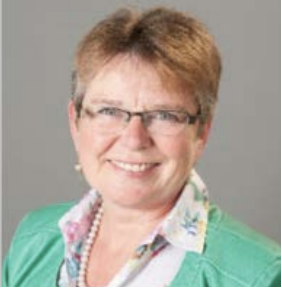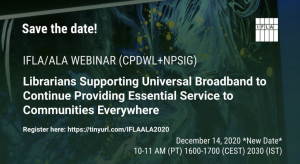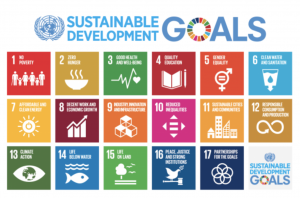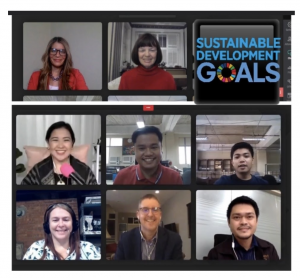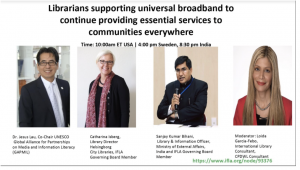Colleagues, we are excited to announce the our next episode (for season 2) of the CPDWL Podcast Project where we feature library and information professionals who support and participate in professional development work.
This episode’s returning guests are Ulrike Lang and Vera Keown. They both will highlight more about coaching work in IFLA and in their own experiences.
To see the episode, see here: https://anchor.fm/ifla-cpdwl/episodes/S2E4-Ulrike-Lang-and-Vera-Keown-on-Coaching-Basics-Part-II-eo3aeq
Transcript is below.
Ulrike Lang – Until June 2020 Ulrike Lang was head of the Education and Training Department at the State and University Library Hamburg, Germany. Also responsible for Health management, conflict management, diversity management and addiction prevention. She is a member of the German library association BIB and gave several presentations at national and international conferences concerning CPD. Ulrike Lang already served eight years at the Continuing Professional Development Section (CPDWL) as co-chair, was four years member of the Education and Training Section of IFLA and now returned to CPDWL again as co-chair. She is a member of the coaching working group and served also as coach in the past years. At the 2019 Satellite conference in Zagreb she held the workshop „Challenging Presentation Needed? „
Vera Keown has been with the University of Manitoba in Winnipeg, Manitoba, Canada since 2010. First as Head of the Sciences and Technology Libraries and since 2014, as an Associate University Librarian. She previously held a number of library and business positions at the National Research Council of Canada. Vera has been a member of the IFLA Management & Marketing section since 2016. She considers it a great honour to be working on the IFLA Coaching Initiative with such talented and dedicated committee members. Vera is a certified leadership coach, Gallup Certified Strengths Coach, and a member of the International Coaching Federation. She offers one-on-one coaching to managers, leaders, and executives of all levels for leadership and performance development, and provides coach training to organizations.
Transcript:
Hi, this is Raymond Pun, Welcome to the IFLA CPDWL Podcast Project. In this space, we talk with library and information professionals who support and participate in professional development work.. Today’s returning guests are Ulrike Lang and Vera Keown. This episode is a continuation from episode 3.
Until June 2020 Ulrike Lang was head of the Education and Training Department at the State and University Library Hamburg, Germany. Also responsible for Health management, conflict management, diversity management and addiction prevention. She is a member of the German library association BIB and gave several presentations at national and international conferences concerning CPD. Ulrike Lang already served eight years at the Continuing Professional Development Section (CPDWL) as co-chair, was four years member of the Education and Training Section of IFLA and now returned to CPDWL again as co-chair. She is a member of the coaching working group and served also as coach in the past years. At the 2019 Satellite conference in Zagreb she held the workshop „Challenging Presentation Needed? „
Vera Keown has been with the University of Manitoba in Winnipeg, Manitoba, Canada since 2010. First as Head of the Sciences and Technology Libraries and since 2014, as an Associate University Librarian. She previously held a number of library and business positions at the National Research Council of Canada. Vera has been a member of the IFLA Management & Marketing section since 2016. She considers it a great honour to be working on the IFLA Coaching Initiative with such talented and dedicated committee members. Vera is a certified leadership coach, Gallup Certified Strengths Coach, and a member of the International Coaching Federation. She offers one-on-one coaching to managers, leaders, and executives of all levels for leadership and performance development, and provides coach training to organizations.
Welcome back Vera and Ulrike!
Hello, Ray. Hi, Raymond. Thanks.
2:08
So we’re really excited to have you both back to talk about the process, the basics of coaching. And I will admit, currently, right now, I am actually a coach at the New York Public Library as a volunteer supporting users of New York Public Library, who are interested in career development, resume health, planning, and so forth. And I initially had worked at New York Public Library, oh, maybe the past seven, eight years ago. And so when the pandemic happened, there were offering up virtual services and, and I decided to volunteer, and I’ve been volunteering since May of 2020. And I’ve been having such a great opportunity meeting with all types of users who are looking for coaching help. And so I’m so excited for this episode, because we can have a conversation on this, on the experiences that others are having and the basics and concepts of coaching.
Now, I’m curious here, as our first question, why did you get involved in coaching? Did you had experiences from it before? Ulrike, why don’t you start first?
3:12
Yes, happy to do. And I was always happy to be involved in lifelong learning. I think it’s so important. And coaching is not only a learning for the coachee, but also for the coaches as well. And I had some experiences from my work at the state and university library in Hamburg, where I was responsible for education and training of the staff. And in some reasons, I had to find coaches for those situations where it was appropriate to get input from outside is almost helpful, and I would German Library Association. We had a mentoring program years ago, and I was involved as a mentor. The situation for mentorship is more of a learner and an advisor that was curious to learn more of coaching, while it’s a low threshold possibility if the coach and coachee are familiar with the basic rules.
4:09
Well, thanks for giving us your context here. How about you Vera?
4:14
Well, for me, I took a coaching program in early 2019. As a form of professional development for myself, I was originally looking for another way to support my managers beyond the usual advice giving and problem solving. And it far exceeded my expectations. The training program that I took and I was determined to learn all I could about coaching. So since that time, I’ve taken a number of other courses and I’m on my way to towards becoming a certified coach with the International Coaching Federation. I had been a member of the iIFLA Management and Marketing section for a few years and last year they were looking for a member to join the coaching initiative working group. I eagerly volunteered as I thought this was an area where it you know, I could make a significant contribution to IFLA. And I really wanted to spread the word about coaching and have more librarians be able to experience the benefits of coaching.
5:16
That’s a really great points there. And for our listeners, in our previous episode, we dive deeply into the resources of CPDWL and management marketing section on the training tools that are available, please check that out. And so I do want to say that on LinkedIn, I do see people sharing their certification of international coaching Federation. So that’s pretty exciting for you, Vera, to work on that. And so let’s talk let’s talk about why coach training is important. And sort of from your perspective, Vera, would you like to start first?
5:53
Sure. So I think a lot of managers and leaders have have coaching in their job description. It’s usually, you know, within a sentence of manage, mentor, and coach employees. I know it’s always been like that in mine whenever I’ve had management positions. However, I think we assume that every manager knew what coaching was. And now that I’m a trained coach, I know that what I was doing before as a manager was not necessarily coaching in the truest sense. And so coaching is a tool that managers can use when their employees surpass their need to be managed and mentored. It’s it’s the next level of development for your employees. So coach training is important, because in order for your employees to really benefit from it, it needs to be different from managing and mentoring. The coach needs to learn how to help the coachee solve their own problems, or develop their own strategies. If you know, just do what I did strategy always worked, we wouldn’t really need this ongoing management, training and management books that we have that teaches us how to be great leaders. So learning to coach has many benefits for the manager as well. While coaching employees may seem like it’s a bit more time consuming at first, in the long run, you help your, your help your employees develop their own abilities to solve their own problems. And it really does take the pressure off managers to always have to have, you know, right answer to every situation that comes up. So I like to describe myself as a recovering problem solver. When I describe myself as a coach.
7:43
recovering problem solving, that’s a good one. So Ulrike, tell us why coaching training is important.
7:49
As I think everybody has experiences in dealing with people at work, or in their private environment. But it’s a difference to give just an advice or an hint or offer help, how to deal with the problems, then to offer coaching. And it’s important to have knowledge about the regulations of coaching, and the kind of questions you as a coach have to ask. Otherwise, there’s a big risk of dropping into mentoring. So I think the coach training series which are offered on the CPDWL website, unnecessary and very useful.
8:24
Definitely. And so with that being said, if there are people who are interested in being a coach, tell us what every coach needs to know, Vera.
8:36
Well. So in the the coach training recordings, I covered the important principles for coaching. And these include creating a safe and trusting environment and developing a good relationship with the coachee. Coaching requires the coachee to discuss often some difficult situations and feelings and without creating trust, they need to know that they won’t be judged or that they’re and that they also their information will be kept confidential. Without that it’s really difficult to make any progress with with coaching. Probably one of the most important principles, though of coaching is that the coachee owns the agenda. And what I mean by that is that the coachee decides what the goals are, what they want to accomplish in the coaching session, and the strategy they will use to to solve their problems or reach their goals. So this is what makes coaching so different from managing and mentoring. In managing, the manager says, ”You need to do this and it has to be done this way”. In mentoring, the mentor says, ”What you need to do is this, and here’s how I did it”. Or they’ll say, “Well, I did it this way and it worked for me so maybe you can try that as well”. And finally with coaching, we want to hold people capable. As coaches, we really need to believe that the coach is capable of achieving their goals or solving their problems on their own. They have all the knowledge and wisdom to come up with a plan for success. If we just give advice, we’re really robbing them of the opportunity to learn, grow and develop.
10:15
Those are really great points. And it’s a form of self empowerment, sounds like and trying to develop their own capabilities, as you were saying, to be able to make the decisions and address the problems on their own, of course, with support right from the coach. And as I hear you, I’m very, I’m reflecting on my own experience, where I give options, I don’t tell them what they should be doing or not doing, but give suggestions and maybe some ideas, but also in a way that helps them because I am not in regular contact with some of the coachee. And they have to make those decisions at the end. And
10:53
I will say, right, it’s very important that you know, it’s not a dependent relationship, it’s it’s, you don’t want to create a situation where the, the coachee always needs the coach forever to solve every problem. It’s a really learning and a developmental opportunity for the coachee to to learn how to tackle problems on their own at some point.
11:17
Right. And so this pivot so our next question about the coachee, what kind of coach expect during a coaching session or Ulrike? Can you start first?
11:27
Sure. There are almost said before, when she described the process of coaching, I think the the coachee, in our process can expect the full attention and the secrecy of the coach, there will be no judgement of the topic, but also a helpful process that will give them the possibility to solve solve their problems with the way that themselves that they have found, and which suits them the best. And sometimes, the coach and coachee might agree agree to continue the relationship for a short period of time, not lifelong, like Vera said before,
12:06
Right, anything else to add?
12:09
Well, so during normally, during our coaching session, the coach will ask the coachee, you know, what their goal or challenges are, what their big issue is and then the coach will often ask you to describe what you’d like to accomplish during the coaching session. So you know, the coaching sessions are usually only about an hour long. So we have to be realistic about what can be tackled in that one session. So for example, with a big goal that may take a few months to complete, the session goal may be able maybe to determine four steps, identify resources, or identify the information that needs to be gathered to move forward. The coach will also ask you why it’s important to you, this question is just as important as what the goal is, unless the coachee is clear on why this is important to them, the commitment to it may not be there. Also, it has to be important to them, and not others. Too often people are chasing goals and definitions of success that are not actually their own.
13:21
Those are really important points there because as I am also listening, I’m thinking about my own experience when I meet with my coachee. Right, and I asked them in the beginning, what would you like to accomplish in this 45 minute session? Right? Like, they only have 45 minutes with me. And we have to focus on the on their agenda, right their needs. But then at the end, we circle back and say, Well, what are their next steps after meeting with me? And they have to really think through and process that. And what’s important to them, right, as you’re saying what are their specific goals, right, and commitments after the session is done so that they’re holding themselves accountable? And I think those are good practices to keep in mind. And so with that being said, I know we talked about a lot of what what we should know and what people should think about in terms of coaching.
But what about misconceptions that people may have about coaching? Ulrike?
14:21
At our first session in Kuala Lumpur, it was very obvious that the coaches, most of them expected mentoring. That means the coach will give you the perfect advice how to solve your problem because of her or his experience. The coaches asked questions, and mentors usually argue in an almost same situation like yours, I did this or that. But that might not be helpful for you as a coachee. Because of your situation might be different in another cultural context of our example. So the coaches will not get answers. But mostly questions. What about you, Vera?
15:04
Oh, I totally agree with Ulrike. Coachees are often surprised by all of the questions asked by by the coach. You know, they don’t understand why the coach will not just tell them what they need to do. It’s it’s important for coachees to understand that they are the ones that have to do the hard work of coaching. Otherwise, you know, it can often lead to the coachee becoming frustrated and feel that the coach has failed them. Another misconception, at least in the business world is that coaching is for managers who are not performing well. So in the past, coaching was often seen as a form of performance management or a last ditch attempt to improve managers performance and relationship skills. But that’s really not the case. Coaching is, is very much for those people who are actually really high performers already. And and they’re looking to, to get to that next level, they just might be stuck for some reason. And finally, there’s also some belief that coaching is only for top executives. There are so many types of coaching available, and and because the focus is on the individual coaching is highly customizable to the person and their situation. So coaching really is for everyone.
16:32
And may I add here?
16:33
Oh, yes, please.
16:35
I think Vera is very right. It’s not only for the top executives, coaching might be very helpful in your personal development, to change your way in business career, the right person who asks you, where do you want to be in five years? And what do you need for this? What supports you and what hinders you? And you might start your own process of development right now.
16:58
Those are really great points. I think, when we think about that kind of work, it’s often those misconceptions that hold people back right to weather, get a coach or to be a coach. And so with that being said, What advice do you have for those who would like to be a coach? Or Ulrike, would you like to start first?
17:18
Sure, you should be really interested in other people, and have an affinity to dive deeper into work situations of others, you are not familiar with? Check how much you like not to solve problems, but light problems by asking questions, be open, be able to follow the regulations of coaching and keep your own feelings apart, be open to learn new techniques and change your own leadership, then you would be really good coach. I think.
17:49
Vera — Yeah, I
17:51
I totally agree with what Ulrike has already mentioned. Those are those are great. That’s great advice for for wanting to be a coach, I would just add also to learn to be comfortable with silence. You know, coaches should not actually do a lot of talking during the session. I think they also have to be willing to take the coachee into some uncomfortable territory. You know, problem solving tackles what’s on the surface, you know, what’s wrong and what needs to be done to change it. With coaching, we dig a little deeper.
Why is this important to the coachee? What will be different if this is solved, and also what’s getting in the way? It’s, it is more effective at getting the coachee to see new perspectives, develop more self awareness, and discover options that they didn’t know were available to them.
18:55
Wow, those are really great and advice from both of you and sharing your perspective on coaching being a coach and coachee and with that being said, for those listening, please be sure to check out the CPDWL website, the coaching resources, webinars, and M&M team and the CPDWL team worked together to put these free resources in many of the different languages for you to take advantage of, and to learn more about being a coach. And with that being said, Thank you so much, Ulrike and Vera for taking your time to talk with us today.
19:32
Thank you. It was a pleasure to be part of this podcast Ray. Thank you for arranging it.
19:39
Yes, thanks very much, Raymond. I really appreciate this and I’m so excited to see what the coaching initiative working group is going to come up with this year.
